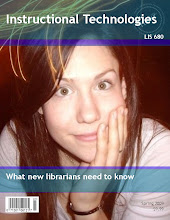Let's start with a definition (and then I'll make a note on what I've learned about definitions not providing enough answers in the instance of media literacy):
medium. (n.d.). Dictionary.com Unabridged (v 1.1). Retrieved February 15, 2009, from Dictionary.com website: http://dictionary.reference.com/browse/medium
me⋅di⋅um / ˈmidiəm
1. a middle state or condition; mean.
2. something intermediate in nature or degree.
3. an intervening substance, as air, through which a force acts or an effect is produced.
4. the element that is the natural habitat of an organism.
5. surrounding objects, conditions, or influences; environment.
6. an intervening agency, means, or instrument by which something is conveyed or accomplished: Words are a medium of expression.
7. one of the means or channels of general communication, information, or entertainment in society, as newspapers, radio, or television.
8. Biology. the substance in which specimens are displayed or preserved.
9. Also called culture medium. Bacteriology. a liquid or solidified nutrient material suitable for the cultivation of microorganisms.
10. a person through whom the spirits of the dead are alleged to be able to contact the living.
11. Fine Arts.
a. Painting. a liquid with which pigments are mixed.
b. the material or technique with which an artist works: the medium of watercolor.
12. a size of printing paper, 18 1/2 × 23 1/2 in. (47 × 60 cm) in England, 18 × 23 to 19 × 25 in. (46 × 58 to 48 × 64 cm) in America.
13. Chiefly British. a size of drawing or writing paper, 17 1/2 × 22 in. (44 × 56 cm).
14. Also called medium strip. Midland U.S. median strip.
15. in medium, Movies, Television. with the principal actors in the middle distance: The scene was shot in medium.
–adjective
16. about halfway between extremes, as of degree, amount, quality, position, or size: Cook over medium heat. He is of medium height.
I'm struck by the prevalence of environment in this definition, and in McLuhan.
"Environments are not passive wrappings, but are, rather, active processes which are invisible... The interplay between the new and old environments creates many problems and confusions. The main obstacle to a clear understanding of the effects of the new media is our deeply embedded habit of regarding all phenomena from a fixed point of view." (p. 68)
I wonder: what sort of environment is the internet? What kind of environment(s) does it proved? create? deny?
"Environments are invisible. Their groundrules, pervasive structure, and overall patterns elude easy perception." (p. 84-85)
Defining media literacy may not be necessary, or at least it may not provide enough answers. Hobbs acknowledges that broad definitions and range of applications of media literacy leads to diverse approaches that bring conflicts and tensions. Media varies so greatly that so many (deep) understandings of the concept can exist, without one being all-encompassing.
I was struck by mcLuhan, in general. The reading was an experience. Having just viewed the videos, I was considering branding, and what mood the combination of images featured in mcLuhan provoked. The book closes with this quote, bringing the mood to a heightened level: "It is the business of the future to be dangerous." - A. N. Whitehead
I disagree at this juncture with mcLuhan on this point: "As new technologies come into play, people are less and less convinced of the importance of self-expression." (p. 123) I am expressing my personal opinion on this matter, thanks to technology. Just saying.
- Humor teaches!!
- "All media are extensions of some human faculty--psychic or physical." (p. 26)
The quotes I'm mulling for the McLuhan quote assignment:
"there is absolutely no inevitability as long as there is a willingness to contemplate what is happening." (p. 25)[This is, I believe, why I'm in this class and profession!]
"The major advances in civilization are processes that all but wreck the societies in which they occur." - A.N. Whitehead (p. 7)
p. 10: unique opportunity to learn by humor (changes perceptions! p. 92)
p. 22: mass audience was
p. 24: Burning Man philosophy!
p. 25: inevitability
p. 26: all media are extensions!
p. 41: extension of sense -> ratios -> CHANGE!
p. 44: Wordsworth: we can't help but see and hear
p. 50: literacy conferred the power of detachment
p. 68: environment
p. 69: multiple models for exploration
p. 70: does over exposure desensitize us?
p. 93: professionalism vs. amateurism
p. 100: student disconnection! education must shift from instruction to probing and exploring
p. 111: music everywhere; visual vs. ear world
p. 113: Socrates! think we'll know everything; know nothing!
p. 123: self expression?
p. 124: no we're adjusting, not inventing; find environments in which we can live with our devices
p. 125: television!
p. 142: propaganda; talk to the media, not the programmers
Sunday, February 15, 2009
Subscribe to:
Post Comments (Atom)

Your note on McLuhan's claim that new technologies obviate the need for self-expression is interesting in light of you and Lisa's discussion of where to continue a blog-comment-based discussion. I wonder if McLuhan wouldn't say that in a way the blog releases either of you from having to go it alone in your thinking about these concepts...?
ReplyDelete